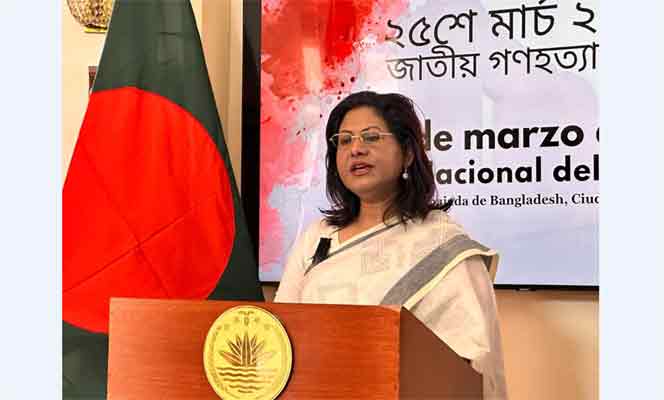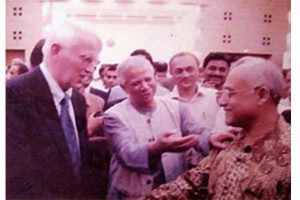
By Imtiaz Ahmed

Bangladesh Ambassador to Mexico Abida Islam has said that Bangladesh should actively explore emerging markets like Mexico beyond traditional destinations to boost export earnings of the country. Bangladesh Ambassador to Mexico Abida Islam said this in an interview highlighting the potentials of the Latin American market.
While Bangladesh’s Prime Minister Sheikh Hasina has expressed interest in exploring new markets, exporters and businessmen of the country would work on exploring the Latin American market, she added. Meanwhile, Abida Islam is a career foreign service officer who belongs to the 15th batch of the Bangladesh Civil Service (BCS) foreign affairs cadre. She served in various capacities in Bangladesh missions in London, Colombo, Brussels, and Kolkata in her distinguished diplomatic career. At the headquarters, she worked in multiple wings in different capacities. She obtained her master’s degree in sociology from Dhaka University and also another master’s on foreign affairs and trade from Monash University, Australia. She is also concurrently accredited to Costa Rica, Ecuador, Guatemala, and Honduras.
The rest of the interview is given below.
1. How would you describe the current state of bilateral relations between Bangladesh and Mexico?
The existing bilateral relations between Bangladesh and Mexico can be characterized as friendly, yet with ample untapped potential for advancement. Historically, diplomatic ties between the two nations were formally established on July 8, 1975, four years after Bangladesh’s independence. These relations have been marked by mutual respect and cooperation, particularly in realms such as trade, culture, and international forums. Despite this foundation, the relations have not fully flourished.
This shortfall can be attributed to a mutual lack of proactive engagement and Bangladesh’s limited diplomatic presence in Latin America. Up until 2013, neither country maintained resident Missions in their respective capitals. Bangladesh took a significant step in June 2013 by opening its Mission in Mexico City, aiming to bolster relations with Latin America, including Mexico. Conversely, although Mexico announced its intention to establish a resident Embassy in Dhaka in March 2023, it has yet to materialize.
Nevertheless, opportunities abound for the expansion and diversification of bilateral engagements. Trade volumes between Bangladesh and Mexico remain modest relative to their economic capacities, underscoring the potential for enhancing commercial ties. Moreover, collaborations in sectors such as technology transfer, culture, education, and tourism present avenues for cultivating deeper connections between the two nations.
In conclusion, while the current state of relations is generally positive, concerted efforts from both sides to explore new avenues of cooperation and leverage existing synergies could significantly bolster the bilateral partnership between Bangladesh and Mexico in the future.
2. What are some key areas of cooperation between Bangladesh and Mexico, and how have they evolved over time?
So far, Bangladesh has entered into Memorandums of Understanding (MOUs) with Mexico covering Foreign Office Consultation, cooperation between the Foreign Service Academies of Bangladesh and Mexico, and Cultural Cooperation. Additionally, a nine-member Mexico-Bangladesh Parliamentary Friendship Group was established at the Mexican Parliament on 06 April 2022, with Deputy Ms. Rosalina Dominguez Flores, MP as its President. However, the formation of Bangladesh chapter of this group is currently pending at the National Parliament of Bangladesh. Such parliamentary groups play a crucial role in strengthening friendship and elevating bilateral relations between countries.
Some key areas of cooperation between Bangladesh and Mexico include:
Trade and Commerce:
Over time, both nations have endeavored to bolster bilateral trade relations, albeit with a gradual increase in trade volumes. There exists potential for further collaboration in various sectors such as textiles, automotive, pharmaceuticals, ICT, home textiles, home appliances and many more. Strengthening trade ties can yield mutual economic benefits and enhanced market access.
Cultural Exchange:
Cultural exchange programs and initiatives have facilitated mutual understanding and appreciation between Bangladesh and Mexico. These encompass art exhibitions, film festivals, and educational exchanges. Further investment in cultural exchange can deepen people-to-people ties and foster cultural diplomacy. Promoting awareness of each other’s cultural heritage can fortify bilateral relations and tourism opportunities.
Climate Change and Environment:
Both Bangladesh and Mexico confront environmental challenges, including the impacts of climate change and natural disasters. Instances of cooperation have occurred in areas such as climate resilience, renewable energy, and environmental conservation. Enhanced collaboration on climate change adaptation and mitigation strategies can yield benefits for both nations. Sharing best practices, facilitating technology transfer, and undertaking joint research initiatives can contribute to global endeavors aimed at addressing climate change.
Agriculture: Both countries share common challenges in agriculture, including food security and adapting to climate change. Collaboration in research, technology transfer, and capacity building can exchange valuable knowledge. Bangladesh, with expertise in rice cultivation and fisheries, can share insights, while Mexico’s advanced agricultural technologies can enhance productivity. Joint initiatives can improve agricultural productivity and livelihoods.
Women Empowerment: In women empowerment, both nations recognize the importance of gender equality. Collaborative efforts can promote women’s entrepreneurship, access to education, and participation in decision-making. Exchange programs and joint projects can address gender-based challenges and foster inclusive development.
By leveraging their strengths, Bangladesh and Mexico can enhance cooperation, leading to sustainable development, poverty alleviation, and inclusive growth.
3. Are there any significant trade or investment agreements between Bangladesh and Mexico, and if so, what impact have they had on bilateral relations?
A few Mexican companies have shown interest in entering the manufacturing sector in Bangladesh, prompting efforts to foster partnerships between firms in both countries. Particularly, the textile and clothing industry presents promising opportunities for collaboration. However, it’s crucial to note that Mexico primarily manufactures goods for its domestic market, so sectors like pharmaceuticals or light industry might offer more favorable ground for trade relations.
As of now, Bangladesh and Mexico have not formalized any trade agreements. In September 2023, our former commerce minister visited Mexico, meeting with the secretary of economy to express Bangladesh’s interest in bilateral trade. Despite Bangladesh establishing a joint working group for bilateral trade, we are yet to receive a response from Mexico.
The Export Promotion Bureau in Dhaka plans to participate in the upcoming INTERMODA Fair in July 2024 in the State of Guadalajara, the region’s largest textile and RMG fair. This move is seen as a positive step.
As an Embassy, our efforts focus on sharing information with relevant ministries and private sectors of both countries. While government responses have been consistent, unfortunately, we often encounter a lack of response from chambers of commerce and other private sector entities.
It’s worth noting that many major economies are increasingly turning to Mexico for nearshoring opportunities. However, Bangladesh seems to be missing out due to its relatively low foreign currency reserves. With such opportunities being rare, Bangladesh must act swiftly.
In conclusion, significant trade agreements between Bangladesh and Mexico could bring substantial benefits, fostering economic cooperation, increasing trade and investment, and strengthening diplomatic ties. However, their actual impact will depend on the terms and execution of these agreements, as well as the broader economic and geopolitical context.
4. How do cultural exchanges contribute to strengthening ties between Bangladesh and Mexico?
Both Bangladesh and Mexico share numerous cultural similarities, spanning art, identity formation, history, gastronomy, and aesthetics. Despite geographical distance, Mexico’s rich artistic heritage resonates with elements found in Bangladesh. For instance, textile art’s significance, historical production processes, vibrant colors, and its role within communities offer potential for future collaboration. Moreover, there’s growing Mexican interest in exploring distant cultures, including those of Bangladesh.
In cultural exchange, progress is notable. Mexico actively engages in cultural events and forums, increasingly discussing indigenous languages, gender equality, and environmental sustainability. Bangladesh is encouraged to contribute to these discussions, further enhancing bilateral understanding.
Cultural exchanges play a vital role in strengthening ties between the two nations:
· Enhanced Understanding: Through festivals, exhibitions, and performances, individuals gain insights into each other’s rich cultural heritage, fostering empathy and understanding.
· Promotion of Diversity: Celebrating the vibrant cultures of Bangladesh and Mexico
promotes inclusivity and strengthens societal bonds.
· Cultural Diplomacy: By showcasing achievements and fostering dialogue, both nations cultivate goodwill on the international stage.
· People-to-People Ties: Direct interactions foster personal connections and friendships, laying the foundation for enduring relationships.
· Promotion of Tourism: Cultural exchanges showcase attractions and experiences, enhancing tourism and cross-cultural interactions.
· Fostering Innovation and Creativity: Exposing individuals to new perspectives stimulates creativity and enriches creative landscapes.
In essence, cultural exchanges are vital to bilateral relations, fostering connection, appreciation, and cooperation. Embracing diversity and cultural diplomacy enriches the lives of citizens, transcending borders.
5. What challenges, if any, do Bangladesh and Mexico face in further deepening their bilateral relations, and how can they be addressed?
The challenges facing Bangladesh and Mexico in further deepening their bilateral relations are multifaceted and require strategic approaches to address them effectively. Bangladesh and Mexico, both heavily reliant on manufacturing, compete in specific sectors. Identifying niche opportunities for Bangladeshi products in the Mexican market is crucial. Establishing a Mexican embassy in Bangladesh could stimulate interest in business opportunities.
However, there is a notable lack of interest from both sides. While Bangladesh’s Honourable Prime Minister has expressed interest in exploring new markets, there is a general lack of enthusiasm or proactive initiatives from Bangladesh side. Meanwhile, Mexico’s attractiveness for Foreign Direct Investment (FDI) owing to nearshoring and its dependency on the US market may present challenges for deepening bilateral relations with economies like Bangladesh.
To address these challenges and enhance bilateral relations:
· Market Diversification Efforts: Bangladesh should actively explore emerging markets like Mexico beyond traditional destinations.
· Enhanced Diplomatic Engagement: Strengthening manpower in the embassy and establishing a commercial wing can bolster engagement.
· Promotion of Trade and Investment: Both countries should conduct targeted promotional activities, such as trade fairs and business delegations, to showcase their strengths.
· Bilateral Agreements: Negotiating and signing bilateral agreements can provide a framework for collaboration in various sectors.
· Capacity Building: Supporting skill development for businesses, especially SMEs, can help them navigate international markets effectively.
· By addressing these challenges and implementing strategic initiatives, Bangladesh and Mexico can unlock the full potential of their bilateral relations, fostering mutual economic growth and prosperity.
· FDI Overwhelm and Nearshoring in Mexico: Mexico’s allure for Foreign Direct Investment (FDI), fueled by nearshoring trends, may overshadow collaborations with countries like Bangladesh. Moreover, substantial investments from other Asian economies pose competition.
· Dependency on the US Market: Mexico’s strong trade ties with the United States may divert attention from relations with countries like Bangladesh, which has less foreign investment influence.
To address these challenges and further deepen bilateral relations between Bangladesh and Mexico, several strategies can be considered:
Market Diversification Efforts: Bangladesh should actively explore and invest in diversifying its export markets beyond traditional destinations. This requires concerted efforts from both government and private sectors to identify and capitalize on emerging markets like Mexico.
Enhanced Diplomatic Engagement: Bangladesh could further strengthen the manpower strength in the Embassy including establishment of a commercial wing.
Promotion of Trade and Investment Opportunities: Both countries should engage in targeted promotional activities to raise awareness about potential trade and investment opportunities. This can include trade fairs, exchange of business delegations, and industry-specific seminars to showcase the strengths and capabilities of each country.
Bilateral Agreements and Partnerships: Negotiating and signing bilateral agreements and partnerships can provide a framework for collaboration in various sectors, including trade, investment, technology transfer. These agreements can provide incentives and protections for businesses to engage more actively in cross-border activities.
Capacity Building and Skill Development: Enhancing the capacity and skills of businesses, particularly small and medium enterprises (SMEs), in both countries can help them better navigate international markets and take advantage of bilateral trade opportunities. This can be achieved through training programs, workshops, and access to market intelligence.
By addressing these challenges and implementing strategic initiatives, Bangladesh and Mexico can unlock the full potential of their bilateral relations, leading to mutual economic growth and prosperity.
6. In your opinion, what opportunities exist for enhancing collaboration between Bangladesh and Mexico in the future?
In my view, there are abundant opportunities for enhancing collaboration between Bangladesh and Mexico across various sectors in the future. Here are potential areas for collaboration:
· Trade and Investment: Identifying key sectors like textiles, agriculture, pharmaceuticals, and technology to foster investment flows and reduce trade barriers.
· Cultural Exchange: Organizing cultural events, exhibitions, and festivals to showcase both countries’ richness, along with artist residencies and exchange programs.
· Education and Research: Establishing partnerships for academic exchanges, joint research projects, and knowledge-sharing in various fields.
· Tourism Promotion: Collaborating on marketing campaigns, tour packages, and tourism infrastructure development to boost travel and cultural exchange.
· Technology and Innovation: Joint research, technology transfer, and partnerships between startups and established companies to drive innovation.
· Sustainable Development: Sharing best practices and collaborating on projects addressing environmental issues, renewable energy, and sustainable development goals.
· Diplomatic Engagement: Strengthening political dialogue through high-level visits, diplomatic exchanges, and participation in multilateral forums.
By leveraging their strengths and exploring synergies, Bangladesh and Mexico can create mutually beneficial partnerships contributing to prosperity and well-being. #






